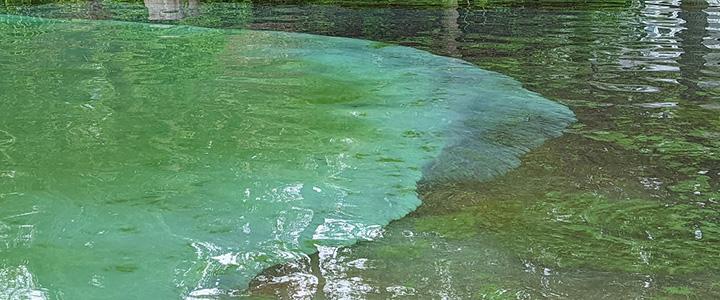
Make Sure to Be on the Lookout for Cyanobacteria Blooms This Summer
As the weather warms this year, be on the lookout for potentially harmful cyanobacteria blooms! Always perform a personal self-risk assessment of the water, looking for discoloration or unusual growth before recreating or letting your pets in the water. Cyanobacteria can look like scums, mats, spilled paint or paint chips. The color of the water can turn green, blue, yellow, white, or brown. If you see something unusual, take pictures and report it with our NEW Bloom Report Form. Remember, when in doubt, stay out!
Cyanobacteria are naturally found in lakes, ponds and rivers across the world. However, under certain conditions they can grow excessively, forming a bloom. Blooms can have high concentrations of harmful toxins produced by cyanobacteria. Symptoms of exposure to cyanobacteria vary, but include skin irritation, gastrointestinal symptoms, fever, sore throat, headache, muscle and joint pain, blisters of the mouth and in serious cases liver and nervous system damage. Cyanobacteria can be fatal to dogs that drink the water or lick themselves clean after swimming. If you or your pet come in contact with cyanobacteria, thoroughly wash with fresh water. If a person or animal is sick from a potential harmful cyanobacteria exposure, please seek medical attention. Inform your physician or veterinarian that you or your pet may have been exposed to toxic cyanobacteria via recreation. You can protect yourself and your pets by staying out of suspicious water and reporting it to NHDES for analysis to help inform your communities of the potential risk.
Check out the Healthy Swimming Mapper for cyanobacteria warnings before you head out for a day of recreation on your favorite waterbody. The map is updated in real time and will always have the most recent information. It will also have new features this year, including photos of bloom material, details on what cyanobacteria are present, and a record of past cyanobacteria warnings. Interested in a weekly statewide cyanobacteria report? Sign up for the Beach Advisories email list to get this report delivered to your inbox on Thursday afternoons.




